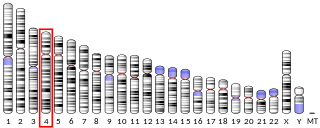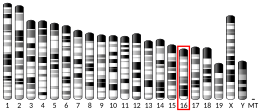
ADP-ribosylation factor 1 is a protein that in humans is encoded by the ARF1 gene.

ADP-ribosylation factor 5 is a protein that in humans is encoded by the ARF5 gene.

ADP-ribosylation factor-like protein 3 is a protein that in humans is encoded by the ARL3 gene.

McKusick–Kaufman/Bardet–Biedl syndromes putative chaperonin is a protein that in humans is encoded by the MKKS gene.

ADP-ribosylation factor-like protein 1 is a protein that in humans is encoded by the ARL1 gene.

Bardet–Biedl syndrome 1 protein is a protein that in humans is encoded by the BBS1 gene. BBS1 is part of the BBSome complex, which required for ciliogenesis. Mutations in this gene have been observed in patients with the major form of Bardet–Biedl syndrome.

Bardet–Biedl syndrome 5 protein is a protein that in humans is encoded by the BBS5 gene.

Arf-GAP with SH3 domain, ANK repeat and PH domain-containing protein 2 is a protein that in humans is encoded by the ASAP2 gene.

Bardet–Biedl syndrome 2 protein is a protein that in humans is encoded by the BBS2 gene.

ADP-ribosylation factor-related protein 1 is a protein that in humans is encoded by the ARFRP1 gene.

ADP-ribosylation factor-like protein 4D is a protein that in humans is encoded by the ARL4D gene.

ADP-ribosylation factor GTPase-activating protein 3 is a protein that in humans is encoded by the ARFGAP3 gene.

Arfaptin-1 is a protein that in humans is encoded by the ARFIP1 gene.

Coiled-coil domain-containing protein 28B is a protein that in humans is encoded by the CCDC28B gene.

IQ motif and SEC7 domain-containing protein 1 also known as ARF-GEP100 (ADP-Ribosylation Factor - Guanine nucleotide-Exchange Protein - 100-kDa) is a protein that in humans is encoded by the IQSEC1 gene.

Tetratricopeptide repeat domain 8 (TTC8) also known as Bardet–Biedl syndrome 8 is a protein that in humans is encoded by the TTC8 gene.

Bardet–Biedl syndrome 7 is a protein that in humans is encoded by the BBS7 gene.

Bardet–Biedl syndrome 9 is a protein that in humans is encoded by the BBS9 gene.

Bardet–Biedl syndrome 10, also known as BBS10 is a human gene.

ADP-ribosylation factor-like protein 13B (ARL13B), also known as ADP-ribosylation factor-like protein 2-like 1, is a protein that in humans is encoded by the ARL13B gene.
























